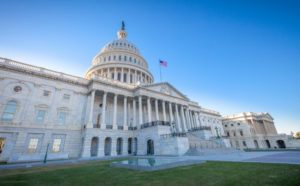The House on Tuesday passed its $740 billion fiscal year 2021 defense authorization bill, which arrives as the White House has officially threatened to veto the final legislation.
Lawmakers held two days of debate on the FY ‘21 National Defense Authorization Act, considering over 400 amendments, including striking provisions that called for cutting the Pentagon’s budget by 10 percent and removing a requirement for the department to submit an annual unfunded priorities list.

The bill passed by a veto-proof majority of 295 to 125.
While the House looks to move its bill forward and the Senate readies a vote on its version this week, the administration has formally threatened to veto the bill citing opposition to current directives including renaming military installations named after Confederate leaders and placing limits on reducing troops in Afghanistan and Germany.
“If [the NDAA] were presented to the President in its current form, his senior advisors would recommend that he veto it,” the White House wrote in a statement.
Pentagon spokesperson Jonathan Hoffman told reporters Tuesday the department is confident an NDAA will be signed and implemented on time when asked about the president’s threat to veto the bill.
“We are confident the administration and Congress will reach an agreement,” Hoffman said.
The House’s NDAA looks to set up key debate with the Senate on cuts to the F-35 program and adjustments to various shipbuilding programs to fund advanced procurement of a second Virginia-class submarine once the bill heads to conference (Defense Daily, June 25).
Rep. Mark Pocan (D-Wis.), co-chair of the Congressional Progressive Caucus (CPC), proposed an amendment Monday to reduce DoD’s budget by 10 percent, excluding cuts to personnel and health program accounts, with the measure ultimately defeated by a vote of 93 to 324.
“If we cut the defense budget just 10 percent, but not for our troops, we free up $74 billion to fight global pandemics like COVID-19 and much more,” Pocan said. “We need to treat the Pentagon like every other department, and that means with fiscal responsibility.”
Pocan received support for the measure from fellow CPC caucus members as well as the Rep. Jim McGovern (D-Mass.), chair of the House Rules Committee.
“We have been told that a Green New Deal is too expensive and that it’s unreasonable to cancel crushing student loan debt. But there was always enough money lying around to raise the Pentagon’s budget. Decade after decade, we shortchanged the American people while we shoveled more money into building more nukes or more military bases halfway around the world,” McGovern said. “I don’t support Congress funding weapons our troops don’t want. And I don’t support Congress funding forever wars that our country shouldn’t even be involved in.”
Rep. Mike Turner (R-Ohio) said the measure was “sequestration on steroids” and Rep. Liz Cheney (R-Wyo.) joined in opposition calling the amendment “deeply irresponsible stunt that would have grave implications for our national security.”
The House also voted against adopting a measure from Rep. Pramila Jayapal (D-Wash.) that would have removed the requirement for the military services and combatant commands to submit unfunded priorities lists. The measure was voted down 173 to 241.
During debate, Jayapal noted the FY ‘21 unfunded priorities list totaled $18 billion, calling it “wishlists of weapon systems the Pentagon couldn’t fit into its already massive budget.”
“The practice is irresponsible and it undermines the very goals of budget. So why does it exist? Because it gives special interests and the defense contractor industry an opportunity to argue for Congress to fund additional extremely expensive weapon systems not important enough to make it into the Pentagon’s budget,” Jayapal said.
Rep. Mac Thornberry (R-Texas), ranking member of the House Armed Services Committee, noted his opposition to the measure calling it a means to ensuring Congress has a complete view of DoD’s programmatic requirements.
“We in Congress need that broader look. We need to hear from combatant commanders on what did not make it into the budget, because then we may have a different judgment call about what should be in the budget,” Thornberry said. “Those reports help us do our job. That’s why it’s a matter of law that they be sent to us. And that’s the reason it makes no sense to deny us the information we need to fulfill our responsibilities under the Constitution.”
The House did adopt a measure, by a vote of 227 to 179, from Rep. Ben McAdams (D-Utah) to ban funding for new nuclear testing.
“For 24 straight years, the Department of Energy and DoD continue to certify the safety, security and effectiveness of our nuclear weapons stockpile without the use of nuclear explosive testing. And that was confirmed to still be the case at the end of June,” McAdams said. “Nuclear clouds must never again threaten the health and the safety of those living downwind.”
Rep. Adam Smith (D-Wash.), the HASC chairman, supported the amendment, adding it was required as the Senate has $10 million in its bill to fund potential nuclear testing.
Additional amendments adopted to the House’s NDAA include increasing federal incentives to secure the domestic supply chain for semiconductor manufacturing, working toward eliminating U.S. dependency on China for rare earth minerals by FY ‘35 and requiring the Secretary of Defense to consider additional installations for 5G prototyping programs.